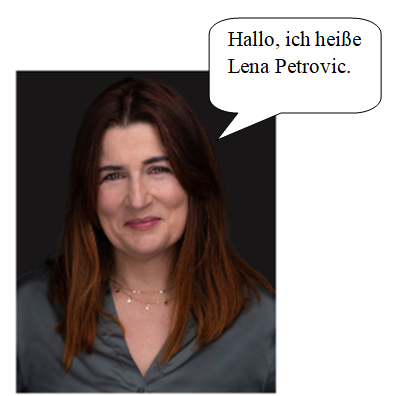Learn how to describe your daily routine in simple German!
This beginner-friendly A1 lesson includes basic vocabulary, grammar, sentence structure, and common phrases to help you talk about your day with ease.
📌 Lesson Overview
- My Day – A Short Story
- Times of the Day in German
- Vocabulary: Daily Routine (Tagesablauf)
- How to Ask Questions
- Grammar: Separable Verbs
- Word Order and Time Adverbs
- What Do You (Not) Like Doing?
- Mini Glossary
- Study Tip
📖 My Day – A Short Story
🧑🦰 Lena Petrovic talks about her day:

Ich stehe immer um sieben Uhr auf und mache Kaffee und Frühstück für meine Familie.
Mein Mann geht um halb acht zur Arbeit, und meine Kinder gehen zur Schule.
Am Nachmittag kaufe ich oft im Supermarkt ein.
Abends sind wir alle zu Hause. Wir machen oft Spiele oder gehen spazieren.
Luka und Jan spielen Computerspiele, und Mia geht immer früh ins Bett.
Mein Mann und ich trinken manchmal ein Glas Wein und sprechen über den Tag.
Um elf Uhr gehen wir ins Bett.
📌 Translation:
I always get up at 7 o’clock and make coffee and breakfast for my family.
My husband leaves for work at 7:30, and my kids go to school.
In the afternoon, I often shop at the supermarket.
In the evening, we’re all at home. We often play games or go for a walk.
Luka and Jan play computer games, and Mia always goes to bed early.
My husband and I sometimes drink a glass of wine and talk about the day.
At 11 o’clock, we go to bed.
🕒 Times of the Day in German
| German | When? | English |
|---|---|---|
| der Morgen | morgens | morning / in the morning |
| der Vormittag | vormittags | late morning / in the late morning |
| der Mittag | mittags | noon / at noon |
| der Nachmittag | nachmittags | afternoon / in the afternoon |
| der Abend | abends | evening / in the evening |
| die Nacht | nachts | night / at night |
🧾 Vocabulary: Daily Routine (Tagesablauf)
| German Verb | English |
|---|---|
| aufstehen | to get up |
| frühstücken | to eat breakfast |
| Kaffee machen | to make coffee |
| arbeiten | to work |
| einkaufen | to shop |
| kochen | to cook |
| putzen | to clean |
| spazieren gehen | to go for a walk |
| (Computer) spielen | to play (games) |
| fernsehen | to watch TV |
| telefonieren | to make a phone call |
| ins Bett gehen | to go to bed |
🗓 Daily Routine – Example Schedule
👉 morgens (in the morning):
- Ich stehe auf.
- Ich mache Sport.
- Ich frühstücke.
👉 vormittags (late morning):
- Ich arbeite.
- Ich telefoniere.
- Ich trinke Kaffee.
👉 nachmittags (afternoon):
- Ich kaufe ein.
- Ich koche.
- Ich putze.
👉 abends (evening):
- Ich spiele ein Computerspiel.
- Ich sehe fern.
- Ich gehe ins Bett.
❓ How to Ask Questions
W-Questions (with a question word):
- Wann kaufst du ein?
→ Ich kaufe nachmittags ein. - Wann siehst du fern?
→ Ich sehe abends fern. - Wann kochst du?
→ Ich koche vormittags.
Yes/No Questions:
- Machst du morgens Sport?
- Spielst du abends ein Computerspiel?
- Siehst du nachmittags fern?
🔠 A1 Grammar: Separable Verbs (Trennbare Verben)
| Verb | Example Sentence |
|---|---|
| aufstehen | Ich stehe um 7 Uhr auf. |
| fernsehen | Du siehst abends fern. |
| einkaufen | Wir kaufen im Supermarkt ein. |
| anrufen | Ich rufe meine Mutter an. |
🔔 Note: The prefix goes to the end of the sentence!
⏱ Word Order and Time Adverbs (immer, oft, …)
| Adverb | Meaning | Frequency |
|---|---|---|
| immer | always | 100% |
| oft | often | 80% |
| manchmal | sometimes | 50% |
| nie | never | 0% |
🧩 Adverbs usually come after the verb:
- Ich spiele manchmal Fußball.
- Wir essen oft Pasta.
- Sie arbeitet vormittags.
🗣️ What Do You (Not) Like Doing?
Use gern (like to) and nicht gern (don’t like to) to talk about your preferences.
✅ Examples:
- Ich esse gern Pizza.
- Ich koche nicht gern.
- Ich sehe gern fern.
❓Was machst du gern?
👉 Choose the activities you like or don’t like doing:
| gern / nicht gern | Activity (English) |
|---|---|
| putzen | clean |
| Deutsch lernen | learn German |
| spazieren gehen | go for a walk |
| früh aufstehen | get up early |
| Sport machen | do sports |
| Musik hören | listen to music |
| fernsehen | watch TV |
| lesen | read |
| Fußball spielen | play soccer |
| Pizza essen | eat pizza |
| lange schlafen | sleep late |
📘 Mini Glossary
| German | English |
|---|---|
| aufstehen | to get up |
| frühstücken | to eat breakfast |
| Kaffee machen | to make coffee |
| das Frühstück | breakfast |
| arbeiten | to work |
| einkaufen | to shop |
| kochen | to cook |
| putzen | to clean |
| spazieren gehen | to walk |
| spielen | to play |
| fernsehen | to watch TV |
| telefonieren | to call |
| ins Bett gehen | to go to bed |
| der Morgen | morning |
| der Abend | evening |
| immer | always |
| oft | often |
| manchmal | sometimes |
| nie | never |
| gern / gerne | with pleasure / like to |
| nicht gern | don’t like to |
✨ Study Tip
📅 Practice daily!
Try writing one sentence every day using the new verbs and adverbs.
For example:
„Ich frühstücke morgens und arbeite vormittags.“
(I have breakfast in the morning and work in the late morning.)
✍️ Practice Exercises
- Was machst du heute? – Daily routine verbs
- Satzbau üben: Word order in a sentence
- Wann machst du das? Multiple choice quiz
- immer, oft, manchmal, nie
- Activities and the parts of the day
- Was machst du morgens? Quiz
- Trennbare Verben – Verbs with a separable prefix
- Word order in the sentence – What are you doing when?

